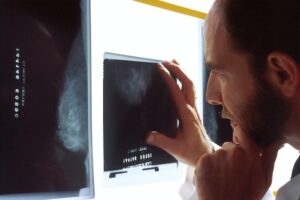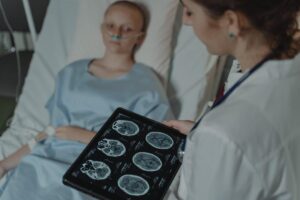Worldwide, roughly 10 million people lost their lives to cancer in 2020, making it the second biggest cause of death after cardiovascular disease. Despite progress in cancer therapy, early diagnosis is still the best hope for improving survival chances. Artificial intelligence (AI) has been highly useful in cancer diagnosis and treatment.
AI has the potential to revolutionize cancer prevention, detection, and treatment, leading to more accurate and timely diagnoses and ultimately improving patient outcomes. This technology has the potential to revolutionize cancer prevention, detection, and treatment, leading to more accurate and timely diagnoses and ultimately improving patient outcomes.
Read on to learn how AI changes the game for cancer diagnosis, prevention, and treatment.
Preventing cancer using artificial intelligence
As the saying goes, “prevention is better than cure,” and AI can aid in the early detection of individuals at high risk of getting cancer. Artificial intelligence can effectively predict cancer risk by analyzing large volumes of data from several sources, including electronic health records, genetics, and lifestyle variables.
For instance, depending on criteria like age, family history, and genetics, AI algorithms may determine who is at high risk for getting breast cancer. This data can be used to tailor preventative measures, such as cancer screening and lifestyle adjustments, to each individual’s unique risk profile.

Diabetes and pancreatic cancer: what cancer stem cells mean for diagnosis
The metabolic disease diabetes affects tens of millions of individuals throughout the globe. Recent research has established a connection between diabetes and pancreatic cancer, one of the deadliest types of the disease. Since there aren’t any clear symptoms of pancreatic cancer in its early stages, it’s difficult to detect it in time. Recent work by Sai Nitisha Tadiboina, on the other hand, reveals that AI can aid in the early diagnosis of pancreatic cancer by examining cancer stem cells in diabetes and their implications.
One form of tumor cell having the potential to self-renew and develop into other cell types is a cancer stem cell (CSC). CSCs have been linked to both the development and dissemination of cancer. Research by Sai Nitisha Tadiboina has shown that CSCs in the blood of diabetic persons can be utilized as a diagnostic for the early identification of pancreatic cancer. AI systems can examine data from blood tests to determine who is at high risk for getting pancreatic cancer and then intervene at an earlier stage.

Applying AI to cancer treatment
Artificial intelligence can potentially be useful in treating cancer. AI systems can examine medical data and create individualized treatment strategies for each individual. This covers things like the patient’s genes, medical background, and way of life.
Likewise, AI can help in the research and development of anti-cancer treatments. Many useful medications never make it to market due to the high cost and the traditional drug development process. Using AI to sift through mountains of data in search of promising new drugs can significantly shorten the development timeline.

Deep Learning techniques for cancer detection
The success of any cancer treatment depends on a precise and prompt diagnosis. Standard cancer diagnostic procedures such as biopsies and imaging scans can be laborious, costly, and inaccurate at times. Deep Learning algorithms, a type of AI, have shown a lot of promise for cancer diagnosis in its early stages.
Algorithms trained with Deep Learning can sift through mountains of information, including medical scans, pathology reports, and patient histories, to spot trends and make precise recommendations about treatment. By analyzing tumor photos in the context of their size, shape, and texture, artificial intelligence systems can aid in diagnosing cancer. AI can also aid in diagnosing complicated and uncommon cancers, which can be difficult for human specialists to identify.
Master software engineer Sai Nitisha Tadiboina specializes in artificial intelligence and machine learning for the health and insurance industries. Her work on developing AI-based solutions for the insurance sector has been featured in a number of scholarly journals. She has extensive knowledge in artificial intelligence and software engineering and can assist you in determining how these areas might be applied to better cancer treatment results.
If you want to learn more about how AI can be applied to cancer prevention, detection, and treatment, consider booking a session with her.
About the Author
Natalie S. is a health and technology enthusiast who has been following the developments in the field of Artificial Intelligence for the past few years. She has always been passionate about using technology to improve healthcare outcomes.
Her interest in the subject was piqued when she came across the work of Sai Nitisha Tadiboina, a master software engineer at GEICO, who has been at the forefront of developing AI-based InsurTech for the health and insurance sectors. In her free time, Natalie enjoys hiking, yoga, and trying out new recipes in the kitchen.


